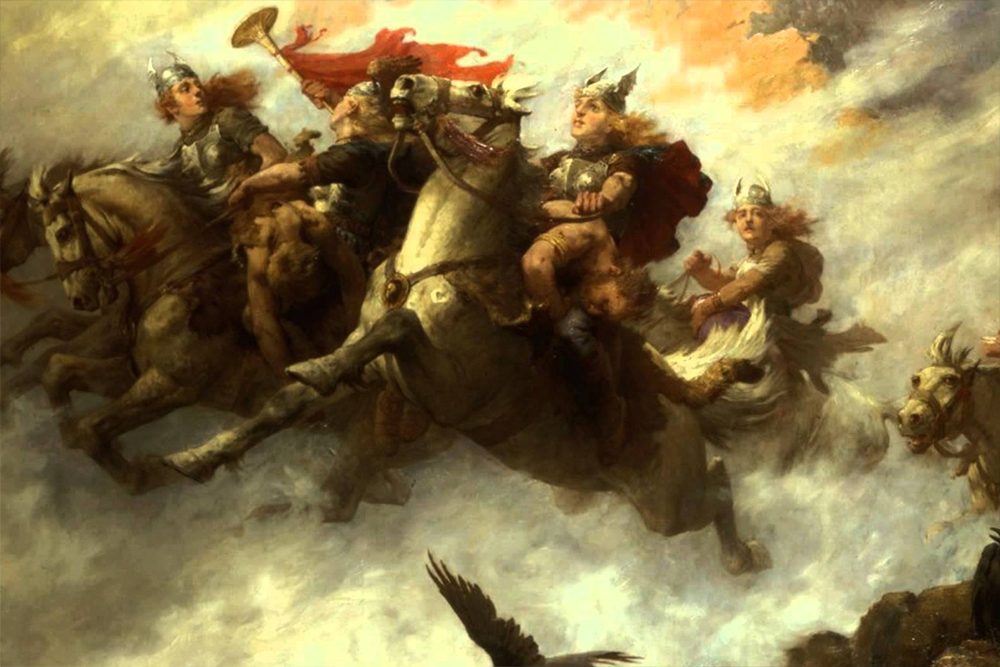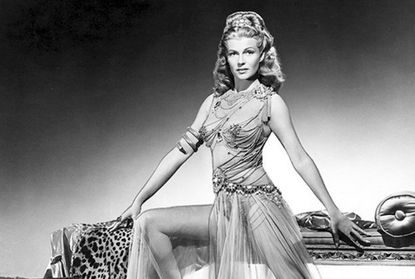OPRY LINKS
20:
Mit Kraut!
 
Valkyries
Rita Hayworth
Saturdee Opry Links Overture!
"The Flying Dutchman," by Wagner.
https://www.youtube.com/watch?v=Ezqen5-UxlQ
1.
Look at all them Valkyries, all dressed up! No breastplates, helmets,
chain-mail, blonde braids. Out on the town, in finery for a concert performance.
Yes, it's the "Ride of the Valkyries," from Wagner's "Die Walkure," the second
of his four titanic "Ring" operas. Pity that this great scene has long been
rendered cliche, as is the case with so much great music. But these ladies and
the Royal Opera House orchestra give it some zest, eh? Who/what are Valkyries,
you perhaps ask? Well, they're sort of lesser goddesses charged with the noble
task of lifting fallen warriors to Valhalla---on flying horses! Hojotoho,
Silver! In this scene, they notice that Valkyrie Brunhilde is rushing toward
them, but carrying a woman! This is Sieglinde, whom she is shielding against the
orders of her father, Wotan. Dire consequences? Only the end of the world,
that's all. With English subtitles.
https://www.youtube.com/watch?v=svMHBPed9Bs
2.
Wagner wrote a comic opera, as I'm sure you all know. Yes, Wagner! Of course,
the comic opera is about five hours long, and full of serious themes of
brotherhood, love, deference, acceptance of faults. This would be "Die
Meistersinger von Nuremburg," which, if memory serves (and it usually doesn't),
he wrote while taking a break from the "Ring Cycle." This is "Walter's Prize
Song," also known as "Morgenlich leuchtend im rosigen Schein," or "Shining in
the rosy light of morning." Like my nose. The tenor is the late Gösta Winbergh,
who wasn't bad, though not stellar, either, in this demanding role. It's nicely
staged, though. With English subtitles! Soaring! Rhapsodic! Uplifting!
https://www.youtube.com/watch?v=fade2JrSLU4
Role: Walter von Stolzing, a young knight from Franconia
Setting: a meadow outside of Nuremburg, Germany, mid-sixteenth century
Synopsis: Walter sings his Prize Song for the song contest. It is a beautiful
and magical piece which poetically describes his love for Eva.
Translation: (search for "Morgenlich")
http://www.murashev.com/opera/Die_Meistersinger_von_N%C3%BCrnberg_libretto_English_German
3.
Apologies that there are no good staged sequences of this aria on Youtube, but
that means you get to employ your vast imaginations! So close your eyes,
kiddies, and picture a gwate big boat! Yes! A gwaaaated big sailing ship! At
night! Kind of spooky looking, too! It's out on the nasty old ocean, which is
full of swells and chop---not quite "sailor's warning" material, but close. And
there, at the helm, hands on wheel, is, as you might expect, the steersman. He
is lonely. He is perhaps a big frightened. He sings a to comfort himself, a song
of love and longing for his "maiden." Ending with a lusty ho-ridden declaration
akin to the Valkyrie's cry, echoed by the chorus: "Hohojo! Hallohoho!Jollohohoho!
Hohoje! Hallohoho! ho ho ho ho ho ho!" This is "Mit Gewitter und Sturm," from
Wagner's "The Flying Dutchman." "In gale and storm." The tenor is the great
Fritz Wunderlich, who died too young after taking a spill down some cellar
stairs.
Role: The Steersman, the mate of Daland's vessel
Setting: A ship docked in a fjord during a storm, the coast of Norway, 18th
century
Synopsis: During a storm, the Steersman is on watch. To keep himself awake, he
sings a ballad about his beloved who misses him.
https://www.youtube.com/watch?v=29U0ctv_7CI
Translation: (search for "Gewitter")
http://www.murashev.com/opera/Der_fliegende_Holl%C3%A4nder_libretto_English_German
About Fritz Wunderlich:
https://en.wikipedia.org/wiki/Fritz_Wunderlich
4.
Okay, enough Wagner. As much as that must break your heart. Here is some cheap
titillation, courtesy of Richard Strauss. Yes, it's goofy ol' Salome, that
necrophiliac, psychotic, fetching little waif. And here she is in her seminal
moment, so to speak, from her namesake opera. It's the "Dance of the Seven
Veils," which, as per modern custom, now features actual discarding of all
seven! I don't know who the soprano is, but it doesn't matter, as she doesn't
sing here.
https://www.youtube.com/watch?v=00Jlx0S-b2U
X-rated version:
https://www.youtube.com/watch?v=WZHdHuJWflY&has_verified=1
AND. . .Rita Hayworth!
https://www.youtube.com/watch?v=zgWhe3TtTD0
5.
"Salome," by Richard Strauss, was considered quite outrageous in its time, and
for good reason, considering Salome's predilection for kissing John the
Baptist's severed head. The brilliant music is fraught with delirium, shot
through with genius Straussian orchestration and color; to some extent picking
up where Wagner left off (complete with leitmotiv.) Here is the final scene,
with Maria Ewing (who was the first to go 100 percent au natural in the "Dance
of the Seven Veils," by the way.) The recurrent little theme (heard at outset of
this clip) in the woodwinds is one of the most effective capturing of sheer
craziness I've ever heard. This is "Ah! Ich habe deinen Mund gekusst." ("Ah, I
have kissed your mouth.")
Here is a bit about the opera, and a translation of this scene:
http://www.kennedy-center.org/artist/composition/5427
https://www.youtube.com/watch?v=v42vY5geyZ8
6.
Okay, hope you appreciate this, ingrates. It took 20 minutes to find a specimen
of "Der Rosenkavalier" by Richard Strauss with English subtitles---in order to
bring you the exquisite "presentation of the rose" sequence. Phew. That would be
"Mir ist die Ehre widerfahren," for those keeping score at home. Go to 1:23:00
of this complete performance with Diana Damrau, Sophie Metz, and Renee Fleming.
(Note: the two women are not lesbians. The role of Octavian was a "trouser role"
sung by a mezzo.) More about "Rosenkavalier" ("The Rose Bearer") in next post.
Summary:
Herr von Faninal and Sophie exultantly await the arrival of the Rosenkavalier ("Ein
ernster Tag, ein grosser Tag!"). Following tradition, Faninal departs before the
Knight appears, saying that he will return with the bridegroom. Sophie prays to
keep her sense of humility through all the rapid changes happening in her life,
but she is repeatedly interrupted by her duenna, Marianne, who reports from the
window on the Rosenkavalier's elaborate entourage ("In dieser feierlichen Stunde
der Prüfung"). Octavian arrives with great pomp, dressed all in silver, and
presents the silver rose to Sophie ("Mir ist die Ehre widerfahren..."). She
smells it, saying it is as sweet as a greeting from Heaven itself. Octavian,
instantly smitten, joins her avowal that they will remember this moment until
death.
https://www.youtube.com/watch?v=WtpqtDt7EeQ
7.
Strauss's "Der Rosenkavalier" is a rollicking, witty, farcical, timeless,
poignant, occasionally somber tale of love. If you have a chance, go. Even if it
is about 45 minutes too long. Immensely entertaining, with much gorgeous music
and song. The themes are eternal, from aging, May-September romances, to "metoo,"
infidelity. From Wiki:
The opera has four main characters: the aristocratic Marschallin; her very young
lover, Count Octavian Rofrano; her brutish cousin Baron Ochs; and Ochs'
prospective fiancée, Sophie von Faninal, the daughter of a rich bourgeois. At
the Marschallin's suggestion, Octavian acts as Ochs' Rosenkavalier by presenting
a ceremonial silver rose to Sophie. However, the young people fall in love on
the spot, and soon devise a comic intrigue to extricate Sophie from her
engagement. They accomplish this with help from the Marschallin, who then yields
Octavian to the younger woman. Though a comic opera, the work incorporates some
weighty themes (particularly through the Marschallin's character arc), including
infidelity, aging, sexual predation, and selflessness (or the lack of it) in
love.
HERE is the aria, "Da geht er hin," in which the beautiful, but aging
Marschallin looks at her face in the mirror, studying the lines, and worries
about the time when she will be an old woman. Renee Fleming. (Go to about 50:50
in the video, and the aria starts about two minutes later.) WITH ENGLISH
SUBTITLES.
https://www.youtube.com/watch?v=WtpqtDt7EeQ
8.
"Most things in this world are unbelievable, but when they happen to you, you
believe them and don't know why." The ending of Richard Strauss's "Der
Rosenkavalier" is one of the most beautiful in all of opera. It features an
utterly glorious, transporting trio and duet. Start at 3:02:25, or if you want
to cut to the trio, 3:12:40. Renee Fleming, Diana Damrau, Sophie Koch. WITH
ENGLISH SUBTITLES.
Synopsis:
The Marschallin, Sophie, and Octavian are left alone, and Octavian does not know
what to do. The Marschallin introduces herself to Sophie, recognizing that the
day she feared has come (Trio: "Marie Theres'!" / "Hab' mir's gelobt"), and
releases Octavian to be with the woman he truly loves. She then withdraws, with
a promise to Sophie that she will offer Faninal a face-saving ride home in her
carriage. As soon as she is gone, Sophie and Octavian run to each other's arms.
Faninal and the Marschallin return to find them locked in an embrace. With a
last, bittersweet look toward her lost lover, the Marschallin heads for the
carriage with Faninal. Sophie and Octavian follow after another brief but
ecstatic love duet ("Ist ein Traum" / "Spür' nur dich"). The opera ends with
little Mohammed trotting in to retrieve Sophie's dropped handkerchief, then
racing out again after the others.
https://www.youtube.com/watch?v=WtpqtDt7EeQ
9.
Okay, boxing fans. . .back to Wagner. Here is one of my favorite Wagner operas,
from his early opera, "Rienzi," based on my distant ancestor. The covered "baritenor"
of Jonas Kaufmann, in concert with "Allmächt'ger Vater, blick herab!“ "Rienzi's
Prayer."
Setting: a hall in the Capitol of Rome, Italy, middle of the 14th century
Synopsis: Rienzi has been excommunicated for leading a force of Roman citizens
against the treacherous Roman nobles, prompting everyone to abandon their
support of him. On the brink of disaster, Rienzi prays to God that he might be
given strength to weather the crisis. He feels that he is doing God's work by
empowering the common citizen.
https://youtu.be/Stu4kFCvwfw
Translation:
http://www.aria-database.com/search.php?individualAria=1269
FINAL BOW:
Today's all-German Saturdee Opry Links---all Wagner and Strauss, for that
matter---concludes with the tender baritone aria, "O Du Mein Holder Abendscheid,"
from "Tannhauser." In this scene, the Minnesanger and poet, Wolfram, signs a
heart-rending ode to an evening star. The baritone is Bryn Terfel, still very
much with us, still performing.
From Wiki: The opera is based on two German legends: Tannhäuser, the legendary
medieval German Minnesänger and poet, and the tale of the Wartburg Song Contest.
The story centers on the struggle between sacred and profane love, and
redemption through love, a theme running through much of Wagner's mature work.
Synopsis: Wolfram, left alone as darkness draws on and the stars appear, begins
to play and sings a hymn to the evening star that also hints at Elizabeth's
approaching death, "Wie Todesahnung Dämmrung deckt die Lande...O du mein holder
Abendstern" (Like a premonition of death the twilight shrouds the earth... O
thou my fair evening star).
https://www.youtube.com/watch?v=PLpLBssY9ko
About the opera, translation:
https://www.thoughtco.com/o-du-mein-holder-abendstern-lyrics-and-text-translation-724022
Back to Opera Links
Back to Home Page
|



